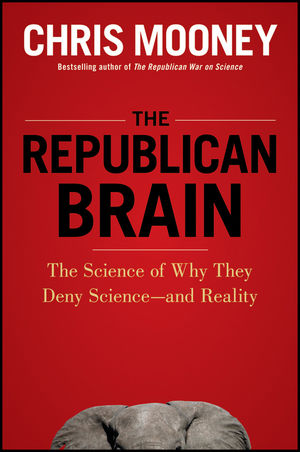The Republican Brain
“Why are today’s liberals usually right, and today’s conservatives usually wrong?” To answer this question, asserts Chris Mooney, we need to explore “the emerging science of the political brain” (7). The result is Mooney’s latest book, The Republican Brain: The Science of Why They Deny Science—and Reality (New York: Wiley, 2012).
Basically, Mooney sets out to explain what he sees (and has seen before) as Republican aversion to science by using the object of that very aversion–namely, various studies from the mind and social sciences.
I won't go into too much detail on the book's argument, but a key question for Mooney is whether the split between “liberal” and “conservative” that runs through the book constitutes an a priori category of analysis and, if so, whether it’s a legitimate one. For Mooney, “conservatives” (and their opposite) are real, set apart by a deep, psychological “resistance to change,” which is tied to “less Openness to Experience (and other related traits), and helps to assuage conservatives’ fear and uncertainty about life and the world” (92).
What you'll note is that this idea of "Openness"—one of the “Big Five” traits believed by some to constitute human personality—is itself a psychological category, one he defines as leading to “intellectual flexibility, curiosity, a willingness to entertain new ideas, and a toleration of different perspectives and values" (65). That is, “conservative” is both a legitimate social category to analyze psychologically and is itself defined in psychological terms.
If this sounds tautological, well…it is. And that tautology has a history. As Jamie Cohen-Cole has shown, the traits that cluster around Mooney’s “liberals”—flexibility, creativity, curiosity, tolerance—were brought forth by a very specific set of liberals working in the cognitive sciences in the midst of the Cold War. Research—and funding—on virtues like “creativity” exploded as part of the fight against an “authoritarian” other; political and social forces built the traits Mooney’s studies now take for granted.
This revelation doesn't–or shouldn't–delegitimate the scientific ideas themselves. Why? As Ian Hacking and others have shown, it's the peculiar nature of the social sciences to build categories of analysis out of their purported object of study—society—and, by doing so, to change the nature of that object in turn. That Mooney finds evidence of shared psychological proclivities in a group defined a priori in (admittedly loose) psychological terms may be no fatal flaw—after all, there may be no other way.
So what's the upshot for us at AmericanScience? Mooney's analysis is certainly polemical, and there's probably a lot to doubt for experts and others, but what's new and useful is the fact that he puts flesh on the political "dispositions" and "epistemic virtues" that structure our political identities and culture. Invoking science to explain science (or antipathy toward it) is fraught with issues of reflexivity–but what account of mind or society isn't?
Basically, Mooney sets out to explain what he sees (and has seen before) as Republican aversion to science by using the object of that very aversion–namely, various studies from the mind and social sciences.
I won't go into too much detail on the book's argument, but a key question for Mooney is whether the split between “liberal” and “conservative” that runs through the book constitutes an a priori category of analysis and, if so, whether it’s a legitimate one. For Mooney, “conservatives” (and their opposite) are real, set apart by a deep, psychological “resistance to change,” which is tied to “less Openness to Experience (and other related traits), and helps to assuage conservatives’ fear and uncertainty about life and the world” (92).
What you'll note is that this idea of "Openness"—one of the “Big Five” traits believed by some to constitute human personality—is itself a psychological category, one he defines as leading to “intellectual flexibility, curiosity, a willingness to entertain new ideas, and a toleration of different perspectives and values" (65). That is, “conservative” is both a legitimate social category to analyze psychologically and is itself defined in psychological terms.
If this sounds tautological, well…it is. And that tautology has a history. As Jamie Cohen-Cole has shown, the traits that cluster around Mooney’s “liberals”—flexibility, creativity, curiosity, tolerance—were brought forth by a very specific set of liberals working in the cognitive sciences in the midst of the Cold War. Research—and funding—on virtues like “creativity” exploded as part of the fight against an “authoritarian” other; political and social forces built the traits Mooney’s studies now take for granted.
This revelation doesn't–or shouldn't–delegitimate the scientific ideas themselves. Why? As Ian Hacking and others have shown, it's the peculiar nature of the social sciences to build categories of analysis out of their purported object of study—society—and, by doing so, to change the nature of that object in turn. That Mooney finds evidence of shared psychological proclivities in a group defined a priori in (admittedly loose) psychological terms may be no fatal flaw—after all, there may be no other way.
So what's the upshot for us at AmericanScience? Mooney's analysis is certainly polemical, and there's probably a lot to doubt for experts and others, but what's new and useful is the fact that he puts flesh on the political "dispositions" and "epistemic virtues" that structure our political identities and culture. Invoking science to explain science (or antipathy toward it) is fraught with issues of reflexivity–but what account of mind or society isn't?
-------------------------------------------------------------------------
See Jamie Cohen-Cole, “The Creative American: Cold War Salons, Social Science, and the Cure for Modern Society,” Isis 100: 2 (Jun., 2009), pp. 219–262.



